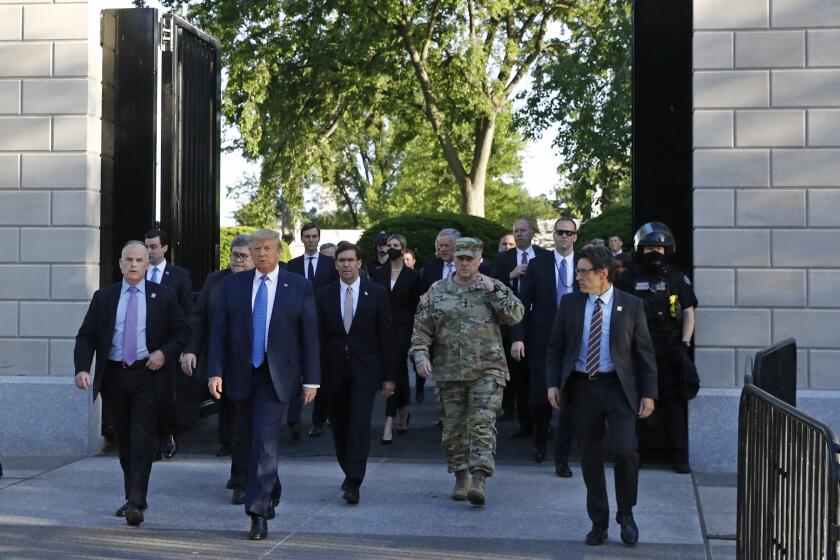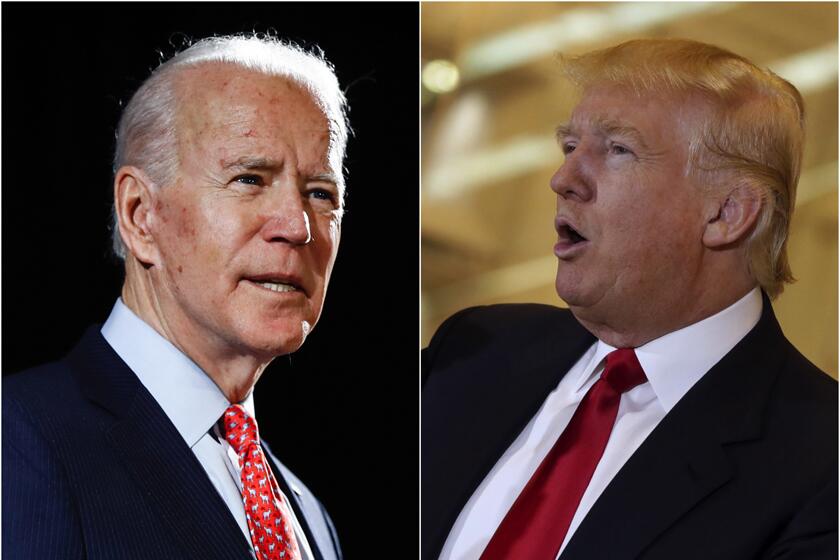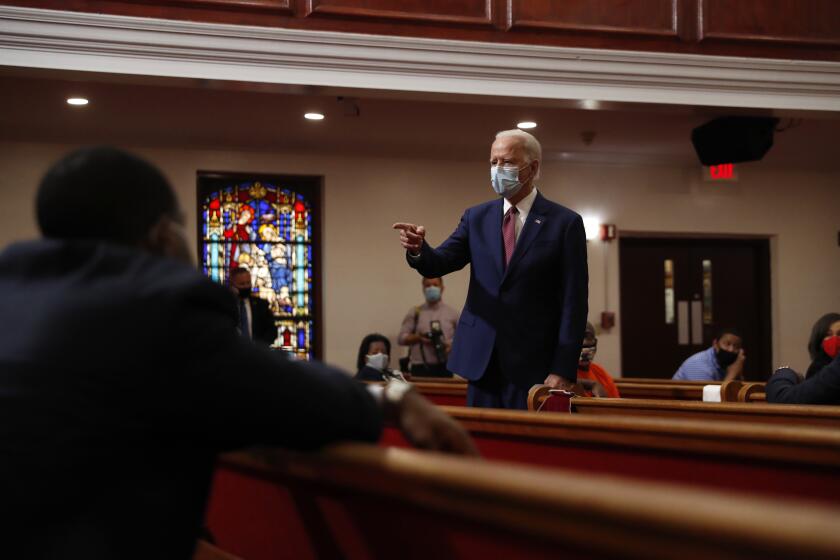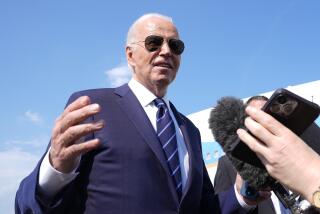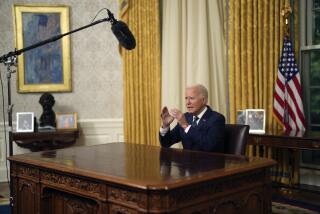‘More interested in power than in principle’: Trump uses racial wounds for political gain, Biden says

- Share via
WASHINGTON — The clash between President Trump and his critics over civil unrest sweeping the country intensified Tuesday, as Joe Biden bluntly accused him of being “more interested in serving the passions of his base than the needs of the people,” and even some Republicans leveled rare criticism of their party leader.
Biden, the Democrats’ presumptive presidential nominee, laced into Trump in searing terms that signaled a new willingness to step out from pandemic-mandated quarantine to be a more forceful leader of the opposition party.
Biden likened the president to Southern segregationists of the 1960s and accused him of exploiting national divisions for political gain and fanning “the flames of hate.”
He criticized Trump for staging a “photo-op” in front of a church across the street from the White House on Monday evening after riot police cleared the way by using force against peaceful protesters.
“The president is more interested in power than in principle,” Biden said. Noting that Trump carried a Bible before cameras, Biden said, “I just wish he opened it once in a while instead of brandishing it.”
For Trump, he said, “narcissism has become more important than the nation’s well-being that he leads.”
The widely publicized speech at Philadelphia City Hall, carried live by cable networks, was the former vice president’s first outside his Delaware home since mid-March when his campaign was sidelined by the COVID-19 pandemic.
The Trump campaign responded by trying to turn Biden’s criticism back on him. Katrina Pierson, a senior Trump campaign advisor, accused Biden of making the “crass political calculation that unrest in America is a benefit to his candidacy.” She said he had a history of “cozying up to notorious racists in the Senate,” an apparent reference to legislative work Biden did with segregationist Southern Republicans such as Sen. Strom Thurmond of South Carolina.
Trump followed up Monday’s photo at St. John’s Episcopal Church with another religious-themed event Tuesday, visiting the St. John Paul II National Shrine in Washington, where he laid a ceremonial wreath and observed a moment of remembrance along with First Lady Melania Trump and several senior aides.
Controversy trailed him.
The Roman Catholic Church’s top official in Washington, Archbishop Wilton D. Gregory, issued a scathing statement about Trump’s visit to the shrine, which is run by the Knights of Columbus, not the archdiocese, and Trump’s decision on Monday to order the use of force to push protesters out of Lafayette Park.
“I find it baffling and reprehensible that any Catholic facility would allow itself to be so egregiously misused and manipulated in a fashion that violates our religious principles, which call us to defend the rights of all people even those with whom we might disagree,” Gregory said.
Trump came up with the idea for Monday’s defiant walk to St. John’s — a church that had been vandalized over the weekend — as a response to criticism on television that he had been hiding in the White House bunker and only tweeting commentary as police clashed with protesters just outside the White House compound’s north gates.
President Trump after 48 hours of public silence, threatens to deploy troops to major cities to quell civil unrest. Democrats express outrage.
Most Republicans, who have been loath to turn on Trump even amid the stormiest periods of his presidency, tried to avoid reporters’ questions about the matter. But a few criticized him for allowing force to be used in service of what looked like a self-aggrandizing political stunt.
“To me at a time like this, the president ought to be trying to calm the nation, pledge to right historic wrongs and be a steady influence,” Maine Sen. Susan Collins, one of the most vulnerable Republican senators up for reelection in 2020, told reporters on Capitol Hill. “I don’t think he was last night. ... I thought that the president came across as unsympathetic and as insensitive to the rights of people to peacefully protest.”
Former President George W. Bush did not mention Trump by name but in a statement appeared to criticize him by implication.
“How do we end systemic racism in our society? The only way to see ourselves in a true light is to listen to the voices of so many who are hurting and grieving,” he said. “Those who set out to silence those voices do not understand the meaning of America — or how it becomes a better place.”
Turmoil mounted as new polling offered a finding about the mood of the electorate that was ominous for incumbents. The share of Americans who said the country was on the “wrong track” surpassed 70% in the latest Monmouth University poll for the first time since 2013, when the poll began. Even among Republicans, the share of adults who said the country was on the wrong track rose from 28% in May to 46% now.
The clash of words and deeds between Trump and Biden underscored a big contrast of leadership style between the two, a real-time opening salvo in the 2020 general election.
Trump’s photo-ops, conceived to present imagery that he and some aides believe conveys strength, underscored his reactive approach to the presidency, which puts a priority on performance, rhetoric and dominating the news cycle at hand.
Uninterested in lengthy intelligence briefings but glued to cable news, Trump has made little effort to hide his impatience when confronted by deeper, systemic problems. He has offered few words about steps that might be taken to chip away at pervasive racism just as he has cast aside public health experts’ warnings about the still uncontained coronavirus pandemic as he has pushed to restart the economy.
Biden, in his remarks Tuesday morning, outlined a far different approach to the presidency, putting in a historical context the unrest following the death of George Floyd at the hands of Minneapolis police officers. The project of creating a more just, equitable country is one that will not be accomplished in one presidential term, he said.
President Trump and Joe Biden took divergent approaches to the police killing of George Floyd and the ensuing protests in Minneapolis.
Biden has made a series of statements designed to present himself, through carefully orchestrated events, as more presidential than Trump, taking the kinds of unifying, calming steps a president typically would in a crisis.
On Monday, for example, he held a roundtable discussion with four mayors, including Eric Garcetti of Los Angeles, to talk about how they are handling the tensions and violence in their cities.
In Tuesday’s 22-minute speech, Biden compared Trump’s Twitter attacks on protesters, including one threatening the use of “vicious dogs,” to language used by segregationists to oppose the civil rights movement half a century ago.
“They weren’t the words of a president,” he said. “They were the kind of words Bull Connor would have used unleashing his dogs on innocent women and children,” he said, referring to the late police commissioner of Birmingham, Ala.
Joe Biden takes an opportunity to portray himself as a leader, stepping up events as protests nationwide appear to leave President Trump paralyzed.
Biden also called on Congress to take immediate action on police reform, not wait for the inauguration of a new president. He urged passage within a month of legislation to outlaw the use of chokeholds by police, set a national standard for police use of force, and more.
Senate Majority Leader Mitch McConnell (R-Ky.) said after the speech that “there may be a role for Congress to play” in addressing systemic racism and police reforms but made no pledge to take up legislation and laid out an agenda of judicial confirmations, a defense funding bill and legislation on national lands conservation.
As violence and vandalism have spread, Biden has aimed to strike a balance between embracing the legitimacy of protesters’ grievances and calling for an end to street violence.
“There’s no place for violence, no place for looting or destroying property or burning churches or destroying businesses, many of them built by the very people of color who, for the first time in their lives, are beginning to realize their dreams and build wealth for their families,” he said.
“Nor is it acceptable for our police sworn to protect and serve all people to escalate tension,” he said.
Biden linked the frustrations of protesters to the economic crisis engulfing the nation during the COVID-19 pandemic.
Floyd’s dying words, “I can’t breathe,” are emblematic of systemic racism that has been worsened by the health and economic crises, he said.
“They speak to a nation where too often just the color of your skin puts your life at risk,” Biden said. “They speak to a nation where more than 100,000 people have lost their lives to a virus and 40 million Americans have filed for unemployment — with a disproportionate number of these deaths and job losses concentrated in the black and minority communities.”
More to Read
Get the L.A. Times Politics newsletter
Deeply reported insights into legislation, politics and policy from Sacramento, Washington and beyond. In your inbox twice per week.
You may occasionally receive promotional content from the Los Angeles Times.
